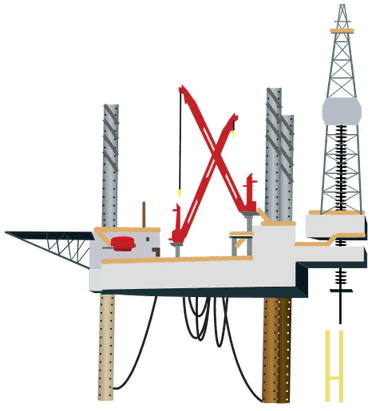 |
American Petroleum Institute |
What is API? |
The American Petroleum Institute (API) is the only national trade association that represents all aspects of America's oil and natural gas industry.
Their nearly 400 corporate members, from the largest major oil company to the smallest of independents, come from all segments of the industry. They are producers, refiners, suppliers, pipeline operators and marine transporters, as well as service and supply companies that support all segments of the industry.
Although their focus is primarily domestic, in recent years their work has expanded to include a growing international dimension, and today API is recognized around the world for its broad range of programs.
Range of programs of API
Advocacy
We speak for the oil and natural gas industry to the public, Congress and the Executive Branch, state governments and the media. We negotiate with regulatory agencies, represent the industry in legal proceedings, participate in coalitions and work in partnership with other associations to achieve our members' public policy goals.
Research and Statistics
API conducts or sponsors research ranging from economic analyses to toxicological testing. And we collect, maintain and publish statistics and data on all aspects of U.S. industry operations, including
supply and demand for various products, imports and exports, drilling activities and costs, and well completions. This data provides timely indicators of industry trends. API's Weekly Statistical Bulletin is the most recognized publication, widely reported by the media.

Illustration of oil rig platform by Tracey Saxby
IAN Image Library (ian.umces.edu/imagelibrary/)
Standards
For more than 75 years, API has led the development of petroleum and petrochemical equipment and operating standards. These represent the industry's collective wisdom on everything from drill bits to environmental protection and embrace proven, sound engineering and operating practices and safe, interchangeable equipment and materials. API maintains more than 500 standards and recommended practices. Many have been incorporated into state and federal regulations; and increasingly, they're also being adopted by the International Organization for Standardization, a global federation of more than 100 standards groups.
Certification
Each day, the oil and natural gas industry depends on equipment to produce, refine and distribute its products. The equipment used is some of the most technologically advanced available in the search for oil and gas and allows the industry to operate in an environmentally safe manner. Designed for manufacturers of production, drilling, and refinery equipment, the API Monogram Program verifies that manufacturers are operating in compliance with industry standards. API also provides quality, environmental, and occupational health and safety management systems certification through APIQR. This service is accredited by the ANAB (ANSI-ASQ National Accreditation Board) for ISO 9001 and ISO 14001. Let APIQR's industry expertise certify your organization to API Spec Q1, ISO/TS 29001 and OHS 18001.
API also certifies inspectors of industry equipment through our Individual Certification Programs, designed to recognize working professionals who are knowledgeable of industry inspection codes and are performing their jobs in accordance with those codes. Through our Witnessing Programs, API provides knowledgeable and experienced witnesses to observe critical material and equipment testing and verification. API's Training Provider Certification Program provides third-party certification for a variety of oil and gas industry training courses, further ensuring that any training provided meets industry needs.
For consumers, API provides the API's Engine Oil Licensing and Certification System (EOLCS). It is a voluntary licensing and certification program that authorizes engine oil marketers who meet specified requirements to use the API Engine Oil Quality Marks. These emblems go directly on each container of oil that retains the certification for and is there to help consumers identify quality engine oils for their gasoline- and diesel-powered vehicles
Education
API organizes seminars, workshops, conferences and symposia on public policy issues. Through API University, we provide training materials to help people in the oil and natural gas business meet regulatory requirements and industry standards. To prepare the next generation of Americans to make informed decisions or pursue careers in our industry, we work with the National Science Teachers Association and other educational groups to impart scientific literacy and develop critical thinking skills in the classroom. resource(s) developed specifically for teachers and students include Energy and Society, a multi-disciplinary K-8 curriculum program, and www.classroom-energy.org, informative and interactive educational resource(s) in one easy-to-use location.
API's mission
API's mission is to influence public policy in support of a strong, viable U.S. oil and natural gas industry essential to meet the energy needs of consumers in an efficient, environmentally responsible manner.
As the U.S. oil and natural gas industry's primary trade association, API..
Engages in federal and state legislative and regulatory advocacy that is based on scientific research; technical legal and economic analysis; and public issues communication.
Provides an industry forum to develop consensus policies and collective action on issues impacting its members.
Works collaboratively with all industry oil and gas associations, and other organizations, to enhance industry unity and effectiveness in its advocacy.
API also provides the opportunity for standards development, technical cooperation and other activities to improve the industry's competitiveness through sponsorship of self-supporting programs.
Reference.. API